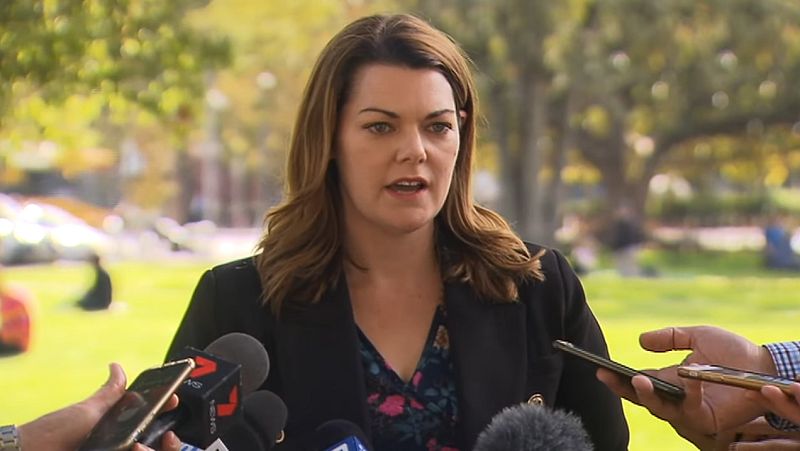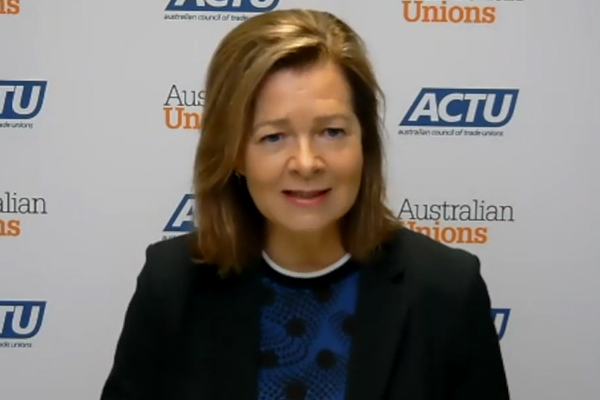A directive from Attorney-General Christian Porter is being regarded as a move by the LNP to control freedom of press, writes William Olson.
AUSTRALIAN GREENS SENATOR Sarah Hanson-Young has called for greater press freedom protections for journalists and whistleblowers, amid Attorney-General Christian Porter’s office declaring that journalists at News Corp and the ABC – who were raided by the Australian Federal Police last June – will not be charged without Porter’s approval.
Hanson-Young, the Greens’ Minister for Communications, has also characterised the ongoing Senate inquiry into press freedom as “going nowhere” on Monday.
In a directive signed and dated 19 September, Porter ruled that News Corp investigative journalist Annika Smethurst, ABC Sydney-based reporters Dan Oakes and Sam Clark, along with whistleblowers aiding both news organisations, would not be facing charges over their reporting of stories deemed sensitive to national security matters, instructing the Commonwealth Director of Public Prosecution not to charge them without his formal approval under sections of secrecy laws.
In essence, Porter is extending shield law protection to those journalists in a decree which may very well have an impact on the Senate press freedom inquiry to help define how journalists may conduct themselves in the lines of their reporting of sensitive issues.
To what extent Porter is extending the shield law protection to Smethurst, Oakes and Clark and their whistleblowers is unclear, as Porter has not ruled out charging them at some point in the future or not charging them altogether.
I have previously said that I would be seriously disinclined to approve prosecutions of journalists except in the most exceptional circumstances and would pay particular attention to whether a journalist was simply operating according to the generally accepted principles of public interest journalism.
If such a request came before me, I would, as first law officer consider the evidence and it would be inappropriate to form a view before this time.
The vague long-term nature of Porter’s decree lends credence to Hanson-Young’s assessment of the Senate inquiry which she happens to be chairing.
Hanson-Young insists that a greater degree of objectivity and transparency must be applied in the name of press freedom:
Freedom of the press and protection for whistleblowers should not be at the whim of the government of the day.
What we need is legislated safeguards to guarantee the freedom of the press and whistleblower protections. These protections must be independent of the Government.
The Senate inquiry into press freedoms will take a close look at this so-called directive. It’s clear the Government’s inquiry, where it investigates its own attack on the freedom of the press, is going nowhere.
The Law Council of Australia shares Hanson-Young’s viewpoints that press freedom must occur as an act of independence above political interference.
Arthur Moses SC, President of the LCA, said:
I have grave concerns that this sort of direction undermines the independence of the CDPP by requiring her to obtain the consent of the Attorney-General before prosecuting an offence.
What will enhance press freedoms in this country is a proper review of our laws to ensure that the actions of journalists doing their job as a watchdog of Government are not criminalised and put at risk of prosecution.
The Senate inquiry into press freedom chaired by Hanson-Young will commence its hearings on 18 October.
In the past, as initially introduced in Federal Parliament in 2017 and revisited in the Senate chambers periodically since then, Hanson-Young and the Greens have championed their Charter of Rights, which details a descriptions of rights on various levels, not the least of which details press freedom.
Greens leader Richard Di Natale, when the Charter of Rights was first introduced, made a point of mentioning that Australia exists as the only Western democracy that does not protect the rights of its people in either legislation or its Constitution, and that includes any level of freedom of the press.
Whether the Greens recall the elements of the Charter of Rights in order to inspire debate and progress towards press freedom legislation remains to be seen.
And while Hanson-Young has said that the Charter of Rights could be included in any discussion of legislative framework that would protect press freedoms, some would agree that it exists as a quality first step in the process.
In addition, the Media, Entertainment and Arts Alliance (MEAA), the union which covers journalism and journalists under its wide umbrella of coverage to creative professionals, stated in August that an urgent need exists to overhaul Australia’s laws that would benefit and enhance press freedom.
Paul Murphy, the MEAA’s Chief Executive, said to a Parliamentary Committee on Intelligence and Security inquiry:
The public’s right to know is a key tenet of a healthy, functioning democracy... it is one of the responsibilities of open and transparent government. It’s also a cornerstone principle of journalism.
In addition, Murphy also added:
Waves of new laws have been introduced by our Parliament. They are framed as being about “national security” but contained within them are powers allowing the Government to intimidate the media, hunt down whistleblowers and lock-up information.
This national security assault on press freedom has worked to criminalise legitimate journalism. The various tranches of national security legislation when applied to journalists and their journalism, clearly have little to do with protecting the nation and more with making sure the public is kept in the dark.
And one would think that bodies such as the MEAA and other media organisations would view Porter’s words and actions as not solving any problems, nor would they be helping shrink the divide between press freedom and national security, nor for fixing the gulf around press and politics, either.
William Olson was a freelance journalist from 1990-2004 and hospitality professional since late 2004. You can follow William on Twitter @DeadSexyWaiter.
 This work is licensed under a Creative Commons Attribution-NonCommercial-NoDerivs 3.0 Australia License
This work is licensed under a Creative Commons Attribution-NonCommercial-NoDerivs 3.0 Australia License
Support independent journalism Subscribe to IA.












